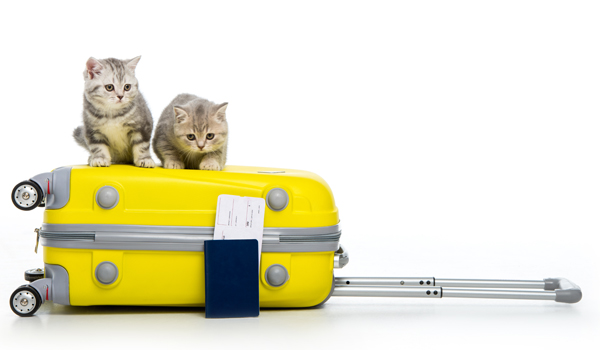
Would you like to take your best friend on your next trip?
Fly with us. We carry your pet with comfort and safety.
What to do
Book your pet's transport when booking your flight on any SATA Azores Airlines sales channel or through your Travel Agency.
Inform the type of animal to be transported, the dimensions of the container and the total weight of both. This booking will be then subject to confirmation.
Have in consideration that it will be more convenient to choose the most direct route possible, avoiding intermediate stops that may interfere with your pet's well-being.
Our pet transportation is subject:
- to the space available on the aircraft.
- to the class you are flying in and the type of aircraft.
- to pets being allowed into the destination country.
- to the kind of animal and the total weight of the animal and the container.
- Don’t forget to check all destination(s) involved to confirm and get all the necessary documentation for the origin/intermediate destinations.
- Attend the airport at the check-in desk opening time so that all the necessary documentation is completed in time and to ensure that the requested service is provided.
- Wherever you are flying to, always bring the container you mentioned when booking, which should be appropriate for the size of the animal, and enough food and water for the whole trip.
- Feed your pet with a light meal and a short drink approximately two hours before the flight and encourage some exercise immediately before dispatch.
- Pregnant females will not be accepted, once the stress caused by the transport can cause a miscarriage and even anticipate the birth during the flight.
- Confirm with your veterinarian that your pet is fit to travel. It is recommended to responsible animal owners, a timely appointment with a veterinarian who will prepare the animals and the necessary documents for the trip, and who will be acquainted with the animal’s health condition.
- The use of tranquilizers/sedation is not advisable, once its effects on animals at high altitudes are unpredictable. The decision to prescribe a tranquilizer to your pet must be made by a veterinarian.
- Tie a dose of extra food to the outside of the container in case there is an intermediate stop, if indicated by the owner or authorized shipper, or in case of unexpected flight delays.
- To avoid the risk of damaging the bladder of large ungulates, it is preferable to offer liquids not less than two hours before delivering the animal at the check-in.
- Before starting the trip, make sure that your pet gets familiar with the container as follows:
- Leave the container open at home with a familiar object inside so that the animal spends time in it;
- Start with only the bottom half of the container available to your pet. When he gets used to being indoors, put the upper half and leave the door open.
- For a pleasant trip, it’s essential that your pet gets familiar with the container.
- Large animals, with more than 45kg, fierce breeds or considered dangerous, can be carried as air cargo. If that’s the case, contact our cargo service.
Examples of species that will not be accepted:
- Farm animals (even if raised in domestic environment, as pigs, chickens, ducks, goats, or pigeons);
- Reptiles (snakes, lizards, iguana, or chameleon) with exception to tortoise and small domestic turtles;
- Breeds classified as potentially dangerous in accordance with the Portuguese Law:
- Fila Brasileiro
- Dogo Argentino
- Pit Bull Terrier
- Rottweiler
- American Staffordshire Terrier
- Staffordshire Bull Terrier
- Tosa Inu
In case of dog crossbreeds that involve a parent of a potentially dangerous breed, the offspring is also considered to be potentially dangerous.
Pets can be transported on our flights in the cabin or hold, depending on their species, size, and weight.
- Small pets up to 8 kg can be transported in the aircraft cabin in a soft, leak-proof carrier/travel bag suitable for transporting animals that allow the animal to stand up, rotate, and lie down naturally. For safety reasons, rodents (e.g., hamsters, guinea pigs, chinchillas), as well as terrapins and turtles, must be transported in a hard box in compliance with the LAR (Live Animal Regulation).
- A pre-booking is required and must be confirmed by SATA Air Açores and/or Azores Airlines.
- The maximum dimensions for the pet carriers on SATA Air Açores and Azores Airlines flights are:
Soft pet carriers/travel bags = 40 cm (length) x 35 cm (width) x 21 cm (height)
Examples:
- Hard boxes for rodents, terrapins, and turtles = 25 cm (length) x 20 cm (width) x 20 cm (height)
Examples:
- It is only allowed per passenger to transport an animal by pet carrier in the cabin, and there are limits for acceptance/confirmation of transport, depending on the aircraft.
- The pet carriers’ doors must have a fully secure locking system.
- The ventilated area of the pet carrier must be at least 16% of the total surface area of its four sides.
- Ventilation openings must be small enough to prevent no part of the animal's body reaches the exterior.
- The pet carrier must be made of a strong material to be escape-proof and leak-proof (waste and urine) and so that the interior isn’t easily destroyed by the animal.
- Absorbent material must be placed on the inside (newspapers, blankets, or paper towels).
- Pet carriers cannot be placed on aircraft seats, and the animal cannot be removed from its carrier during the entire flight.
- It is mandatory that the pet is kept, throughout the entire journey, within a suitable waterproof soft pet carrier/travel bag or hard box provided by the passenger.
- Pets should travel in a seat by the window for safety and comfort. There are appropriate seats that will be assigned when the service is confirmed.
- The pet must be healthy, clean, and pose no danger. It should not be a particularly noisy animal to avoid disturbing other passengers.
- All health and other regulations required by the countries included in the passenger's route, including all necessary documentation, must be complied with.
List of animal species accepted in the cabin:
- Cats, dogs, and ferrets;
- Other small domestic animals (Guinea pigs, hamsters, chinchillas, rabbits, terrapins, and tortoises/turtles);
- The transportation of pregnant females, or in the breastfeeding period, will not be accepted;
- Pets less than 8 weeks old will not be accepted;
- In case of recognized need, SATA Azores Airlines reserves the right not to accept the animal for transport in the cabin but in the aircraft's hold.
- Animals that do not meet the requirements for transportation inside the cabin or that exceed the space available in the cabin, will be transported in the cargo hold, in climate-controlled compartment;
- Animals should be carried only in properly sealed containers;
- Containers must be strong, secure and rigid;
- The maximum dimensions for transportation in hold on SATA Air Açores and Azores Airlines flights are 100 cm (length) x 78 cm (width) x 69 cm (height), but can be under depending on the length, width and height of your pet;
- Handling bars and handles must be included in the construction of the container so that it can be safely handled and loaded;
- Containers must be properly ventilated to a correct air circulation;
- One end of the container (such as the door) must be open and covered with bars, welded mesh or soft expanded metal firmly fixed to the container so that the animal isn’t able to move it;
- Doors must be completely secure and reinforced to prevent any accidental opening.
Container requirements for transportation in the cargo compartment:
- Construction materials: Fiberglass, rigid plastic, metal, solid wood or plywood.
A = Animal’s length from the nose to the tail’s root;
B = Height from the ground to the elbow;
C = Distance between shoulders;
D = Animal’s height in position (top of the head for pets with non-erect ears up - the tips of the ears for pets with erect ears).
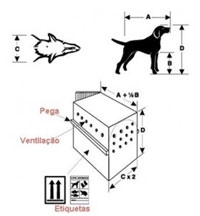
- The container’s length must be equal to: A + 1/2 B. (domestic flights) A + B (international flights);
- The width of the container must be equal to Cx2 (domestic flights) and (C + 3cm) x 2 (international flights);
- The height (flat or rounded top) must be equal to D (domestic flights) and D +7cm (international flights).
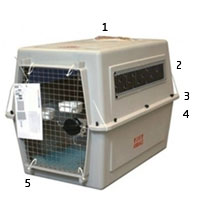
1 = Handles
2 = Side ventilation
3 = Locking pins
4 = Handle bars
5 = Plastic brackets
- Plastic doors are allowed, provided that the hinges and pins are made of metal and sufficiently thickened to ensure their attachment;
- Large doors require additional hinges and two or three secure fixation methods to be totally safe (plastic brackets or pins);
- Ventilation openings must be small enough to prevent that no part of the animal's body contacts with the exterior;
- If the container has wheels, they must be removed or blocked;
- The sides of the container must be solid and must contain holes or mesh for proper ventilation;
- The inside must be smooth and without protrusions that the animal can bite or scratch, causing any kind of damage or compromising the security of the container;
- The upper part of the container must be solid, but ventilation holes are allowed over the entire surface, as long as the safety of the container is not compromised;
- Food and water containers must be inside the container with access from the outside to use in case of delays or in transfer/stopovers, following the indications of assistance provided by the owner or an authorized person. If sealed, an extra dose of food should be strapped to the outside of the container;
- Fish transportation must be carried out in a strong plastic bag inserted in containers made of water resistant material, such as plastic, wood, expanded polystyrene or Styrofoam;
- Certain species require reinforced or metal containers due to its size and weight.

List of animal species accepted for transport in the cargo compartment:
- Dogs, cats, and ferrets;
- Other small domestic animals (guinea pigs, hamsters, chinchillas, rabbits, tortoises/turtles, aquarium fish, and some species of birds).
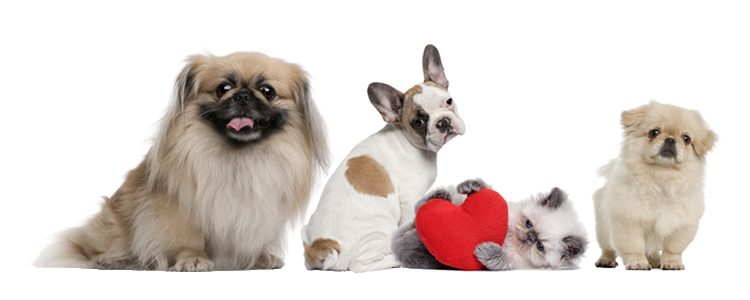
The anatomy of dogs and cats of breeds with a flat nose disposes the occurrence of respiratory problems. Passengers traveling with pets of these breeds should be familiar with their special needs and should be aware of the possible risks involved in the trip.
SATA Azores Airlines welcomes professionally trained and certified assistance dogs to provide special support to passengers with disabilities. They travel for free!
If you wish to travel with your assistance dog, we recommend that you notify us at least 48 hours before departure. The required documentation - which must be delivered where you made your booking or sent to info@sata.pt, in the case of an online booking, up to 48 hours before the departure of your flight - and the behavior of your assistance dog will be evaluated at the airport to ensure the security requirements for final approval. Please be aware that assistance dogs cannot be transported at the owner’s lap and cannot be allocated at the emergency rows onboard.
Categories of assistance dogs accompanying i passengers with disabilities:
- Guide dog (to assist person with visual impairment)
- Hearing dog (to assist hearing-impaired person)
- Service dog (to assist person with mental, organic or motor disabilities)
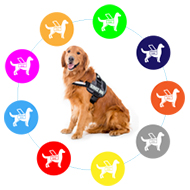
- In the European Union, the assistance dog status is recognized to dogs trained in national or international certificated facilities. Please consider that a card or certificate must be presented to identify the animal as an assistance dog and prove that it has been trained by accredited national or international establishments, regardless of breed.
- On flights that originate or terminate at an airport in the in the USA, it is not necessary to present your assistance dog's training certificate. However, specific forms as established by the USDOT (U.S. Department of Transportation) must be completed and submitted via the website or delivered by a hard copy when booking, or up to 48 hours in advance of the date of travel. Namely, the U.S. DOT form attesting to the animal’s health, behavior, and training , and (2) a U.S. DOT form attesting that the animal can either not relieve itself or can relieve itself in a sanitary manner if the animal will be on a flight that is 8 or more hours .
- Assistance dogs must visibly carry a badge that classifies it as such;
- The passenger must present at the airport the applicable assistance dog documentation, which may vary depending on the origin and destination of the flight, while complying with the health requirements.
For safety reasons related to the structure of our aircraft and the safe transport of assistance dogs, passengers and crew members, the following specific conditions of transport exist, according to weight:
- Dogs up to 11 kg - will be accommodated on the floor, in the passenger seat (at the owner's feet), in a window seat.
- Dogs between 11 kg and 25 kg – will be accommodated on the floor, at your feet, in a window seat. On flights operated by Azores Airlines, they should preferably be allocated a window seat in the first row of Economy or Comfort class. If you are traveling with someone, you will be assigned a window seat and your companion will be seated next to you.
- Dogs between 25 kg and 40 kg – will be accommodated on the floor, at your feet, in a window seat. On flights operated by Azores Airlines, they should preferably be allocated a window seat in the first row of Economy or Comfort class. If you are traveling accompanied, you will be assigned a window seat and your companion will be seated next to you.
If you are traveling alone and considering that the assistance dog must not occupy the space of another passenger, it can only be transported in the cabin with an extra seat, with the dog being accommodated on the floor of the window seat and you being assigned the seat next to it.
SATA Azores Airlines commits to providing the extra seat free of charge if it is available 24 hours before the flight. If you wish to guarantee the extra seat in advance, you can do so by purchasing it.
- Dogs over 40 kg - Acceptance in the cabin will be analyzed case-by-case.
*If there is no room in the cabin to accommodate the assistance dog and the passenger safely and comfortably, given the dimensions and characteristics of the aircraft, the passenger is offered the following options:
- The dog will be transported, free of charge, in the hold, as AVIH; or
- Travel on a later flight with seat availability, free of charge for the change associated with the purchased fare.
- The dog will be transported, free of charge, in the hold, as AVIH; or
On board, the assistance dog must:
- Remain attached with a leash, properly fastened to the passenger seat belt, throughout the flight;
- Have space to safely change position; - Not interfere with the space and well-being of the passenger traveling on the neighbor seat, and for this reason, the voluntary use of a muzzle is recommended for medium and large dogs.
SATA Azores Airlines seeks to comply with IATA’s requirements related to LIVE ANIMAL REGULATION (LAR), by ensuring that all animals are transported as safely and humanely as possible. We also seek to comply with the fulfillment of the documentary requirements, which change according to your destination, as to guarantee the safety of your pet. However, the pet owner is responsible for making sure that the pet complies with all the requirements for transport, as well as entry into the country.
The domestic animals mentioned here are those that travel with their owners, or authorized person *, up to a number of 5, without commercial end, not intended for sale or transfer of property, and that remain under the responsibility of the person accompanying them.
* "«Authorized person»: a person authorized in writing (written declaration and signed) by the owner to a non-commercial transport of the pet".
Please note that animals under 8 weeks of age, pregnant or breastfeeding females are not accepted for carriage.
According to the IATA LAR, more than one animal may be allowed in the same container, to transport in the cargo hold and in the following situations and limits:
- Adult animals of comparable size, up to 14kg each, that are used to cohabit, and the maximum of 2 animals per container, except if they are considered natural enemies;
- Animals from the same litter, up to 6 months old, and up to a maximum of 3 animals per container, as well as animals from the same litter over 8 weeks old, can travel together, as long as they are accompanied by the mother on which they still depend and as long as they are respected. the conditions described in the Transport of Pets in the Basement, in accordance with National regulations.
Domestic Flights
For dogs, cats and ferrets up to four months or more, it’s required:
- Electronic identification by micro chipping(*) or legible tattoo (preferably applied before July 3rd, 2011);
- Proof that the rabies vaccine has been administered to the animal through health bulletin or "Pet Passport", which contains the name and address of the owner.
(*) Note: Cats and ferrets born before October 25, 2019 are exempt from mandatory electronic identification (micro chipping) for domestic travel until October 25, 2022.
Cats and ferrets of any age not vaccinated against rabies (in Portugal, rabies vaccination is not mandatory in these species) and dogs up to 4 months of age must be accompanied by a health certificate issued by a clinical veterinarian, ensuring that the animal, on the date of the clinical examination, did not show signs of diseases specific to the species and that it was fit to travel. For dogs older than 8 weeks and up to 16 weeks, the identification of the keeper and the animal, the reason and the period during which the vaccination suspension should be maintained must also be included.
For other animals that do not have a health bulletin:
- Health certificate issued by a veterinarian authorized by the competent authority stating that the animal has all health conditions and is fit to travel to the final destination, issued within 5 days before the scheduled departure date.
European Flights
It’s necessary to remark that on flights to/from the European Union (except countries where specific rules apply as the United Kingdom, Swedish and Malta), according to Reg. EU 998/2003, passengers carrying Dogs, Cats and Ferrets over 3 months or more must present:
- Electronic identification by micro chipping or legible tattoo (preferably applied before July 3rd, 2011). Any vaccination against rabies before the identification is not considered valid;
- Proof of valid anti rabid vaccination or revaccination done when the animal was at least 3 months old. The anti-rabies vaccination will be considered valid 21 days after completing the primary vaccination or immediately after revaccination, as long as the protocols and the expiration periods required by the manufacturer are respected.
For other animals: Health certificate issued by a veterinarian authorized by the competent authority stating that the animal has all health conditions and is fit to travel to the final destination, issued within 5 days before the scheduled departure date.
Note: SATA Azores Airlines is not authorized to transport live animals to/from United Kingdom in the aircraft cabin and cargo compartments.
Flights originating in Third Countries and returning to Portugal
Dogs, cats and ferrets:
When the animals originate from a country or territory without any risk of rabies (Canada, United States of America and others):
- Electronic identification by micro chipping or legible tattoo (preferably applied before July 3rd, 2011). Any vaccination against rabies before the identification is not considered valid;
- Proof of valid anti rabid vaccination or revaccination, made when the animal was at least 3 months old. The anti-rabies vaccination will be considered valid 21 days after the completion of the primary vaccination or immediately after revaccination, as long as the protocols and the expiration periods required by the manufacturer are respected.
- Health certificate validated by an official authority if it was filled by an authorized veterinarian when coming from third countries.
Note: The reintroduction of animals who have moved to countries outside the EU is allowed with the presentation of the Pet Passport, avoiding the achievement of an official certificate in those countries. However, it is necessary to comply with the health conditions established in those countries and conduct blood analysis for verification of the number of antibodies with respect to the disease (antibody titration), if applicable. In this case, before departing from Portugal or from another UE country, the passport must be filled by an authorized veterinarian.
- The control of these animals in structures called Travelers' Entry Points (ports and airports) is mandatory. The owner must notify the competent authority in the Traveler’s Entry Point in writing. The notification must be made by the owner or authorized person, designated and authorized through a form, available at www.dgv.min-agricultura.pt, completed in the 48 hours before the arrival of the animals.
For other domestic animals (except dogs, cats and ferrets):
- An authorization from the DGAV (Portuguese National Authority for Animal Health) validating the required health conditions for the transportation of the species is necessary.
- Specific health documentation as a health certificate stating, when applicable, the health conditions required by the DGAV (Portuguese National Authority for Animal Health).
Considerations:
The requirements for entry and import of pets vary depending on the destination, type of animal and country of origin.
Before booking for your pet, consult the authorities of the country of destination.
If your pet has to return to Portugal, take into account the requirements described above, on flights originating in Third Countries and returning to Portugal.
You should also check your pet's entry conditions:
- United States of America
- United States Department of Agriculture (USDA) - www.aphis.usda.gov
- Center for Disease Control and Prevention (CDC) - www.cdc.gov
- Serviço Nacional de importação/ exportação - Telefone: (301) 851-3300 / e-mail: VS.Live.Animal.Import.Export@aphis.usda.gov
- Canada
- Canadian Food Inspection Agency (CFIA) - inspection.gc.ca
- Europe, Portugal mainland, the Azores, Madeira and Cape Verde
- Direção de Serviços de Alimentação e Veterinária Regionais – www.dgav.pt
- Autoridade Nacional de Conservação da Natureza, o Instituto da Conservação da Natureza e das Florestas (ICNF) - www.icnf.pt
When animals originate from a country or territory with risk of rabies (Brazil, Venezuela, Ukraine, Africa, and others), in addition to the valid identification and the anti-rabid vaccination, it’s also necessary:
- Blood test for checking the number of sufficient antibodies for rabies (carried out in laboratories approved by the EU, at least 1 month after vaccination against rabies, whether it’s the first time the animal is vaccinated, whether it’s a revaccination);
- Compliance with a period of 3 months until the animals are moved to Portugal, counting from the date of blood collection for the aforementioned analysis. (However, this period of 3 months does not apply to the return of an animal that has left the community space with this analysis carried out with a favorable result, provided that the conditions mentioned above are met);
- Health certificate validated by an official authority, if it was filled by an authorized veterinarian when coming from third countries.
- The control of these animals in structures called Travelers' Entry Points (ports and airports) is mandatory. The owner must notify the competent authority in the Traveler’s Entry Point in writing. The notification must be made by the owner or authorized person, designated and authorized through a form, available at www.dgv.min-agricultura.pt, completed in the 48 hours before the arrival of the animals.
| Weight (including carrier / transport container) | Amounts |
| Pet traveling in the cabin up to 8 kg (17 lbs) | 35 EUR per item |
| Pet traveling in the hold Pet transportation in the hold is included in the checked baggage allowance. When it is exceeded, the following additional fees will be charged: | |
| Cost for excess weight per Kg | 6 EUR / Kg |
| - Weight between 33 kg (72 lbs) and 45 kg (100 lbs) | 70 EUR |
When excess baggage and heavy items (weight between 33kg and 45kg) apply, the sum of both amounts will be charged.
Please consider the following information:
- Values indicated above will be charged per route and in the local currency.
- If your trip includes flights operated by other airlines, other rules may apply.
| Weight (including carrier / transport container) | Amounts |
| Pet in the cabin, up to 8 kg (17 lbs) | 35 EUR per item |
| Pet in the hold Pet transportation in the hold is included in the checked baggage allowance. When it is exceeded, the following additional fees will be charged: | |
| - Weight up to 23 kg (50 lbs) | 25 EUR per item |
| - Weight between 23 kg (50 lbs) and 32 kg (70 lbs) | 50 EUR per item |
| - Weight between 33 kg (72 lbs) and 45 kg (100 lbs) | 100 EUR per item |
Please consider the following information:
- Values indicated above will be charged per route and in the local currency.
- If your trip includes flights operated by other airlines, other rules may apply. On trips involving flights operated by SATA Air Açores and Azores Airlines, Azores Airlines rules apply.
| Weight (including carrier / transport container) | Amounts |
| Pet in the cabin, up to 8 kg (17 lbs) | 70 EUR per item |
| Pet in the hold Pet transportation in the hold is included in the checked baggage allowance. When it is exceeded, the following additional fees will be charged: | |
| - Weight up to 23 kg (50 lbs) | 30 EUR per item |
| - Weight between 23 kg (50 lbs) and 32 kg (70 lbs) | 55 EUR per item |
| - Weight between 33 kg (72 lbs) and 45 kg (100 lbs) | 105 EUR per item |
| - Dogs over 45 kg (100 lbs) on flights to/from Frankfurt | 200 EUR per item |
Please consider the following information:
- Values indicated above will be charged per route and in the local currency.
- If your trip includes flights operated by other airlines, other rules may apply. On trips involving flights operated by SATA Air Açores and Azores Airlines, Azores Airlines rules apply.
| Weight (including carrier / transport container) | Amounts |
| Pet in the cabin, up to 8 kg (17 lbs) | 100EUR / 135USD / 170CAD per item |
| Pet in the hold Pet transportation in the hold is included in the checked baggage allowance. When it is exceeded, the following additional fees will be charged: | |
| - Weight up to 23 kg (50 lbs) | 75 EUR / 90 USD / 120 CAD per item |
| - Weight between 23 kg (50 lbs) and 32 kg (70 lbs) | 100 EUR / 120 USD / 155 CAD per item |
| - Weight between 33 kg (72 lbs) and 45 kg (100 lbs) | 150 EUR / 180 USD / 235 CAD per item |
| - Dogs over 45 kg (100 lbs) on flights to/from the USA and Montreal | 240 EUR / 300 USD / 390 CAD per item |
Please consider the following information:
- Values indicated above will be charged per route and in the local currency.
- If your trip includes flights operated by other airlines, other rules may apply. On trips involving flights operated by SATA Air Açores and Azores Airlines, Azores Airlines rules apply.
Do you have any further questions regarding our animal transport service?


